From 05/08/2024 to 06/13/2024, a series of webinars on the exchange of experience "University Psychological Service and Support" was held as part of the BURN project. Members of the project team actively participated in online sessions, and at the same time got acquainted with additional materials in the MOODLE educational environment of the University of Tartu (Estonia).
Concise content of the webinars:
Webinar 1, 8 05.2024. Career center: exchange of experience in providing support to students (University of Latvia).
The speaker of the webinar was an employee of the Career Center, Dace Siliņa, who presented several key aspects of the center's work.
The career center offers students and applicants a wide range of services in six areas:
- Individual consultations and psychological support: Specialists of the center advise students on choosing a career, finding a job, writing a resume and preparing for interviews. The Career Center offers psychological support to students to help them cope with the stress of job hunting. The career center conducts psychodiagnostics - psychological tests to help students better understand themselves and their strengths and weaknesses. Individual consultations are available for both students and prospective applicants. The career center can help prospective applicants with the choice of university, major and application for admission.
- Mentoring: The Career Center offers students a unique opportunity to participate in a mentoring program. Mentors in the program are experienced graduates of the University of Latvia who voluntarily share their experience and knowledge with students. The mentoring program runs throughout the year. The mentor and the team of students jointly develop a work plan that includes various activities aimed at developing students' career skills. The advantages of participating in the program are: gaining practical experience from experienced professionals; expansion of the network of contacts and acquaintance with potential employers; personal support: mentors provide students with personal support and assistance throughout the year. At the end of the year, students who have successfully completed the program receive honorary certificates.
- Guest lectures: The Career Center regularly organizes guest lectures for students. Lecturers are successful professionals from various fields who share their experience and knowledge with students. Lecturers are selected very carefully, among them can be both guest lecturers from the world's leading universities, as well as influencers and famous personalities who can inspire students and help them develop their professional competencies.
- Job fairs: The career center regularly organizes job fairs where students can meet potential employers. Companies from various industries are invited to the fairs, and they pay an organizational fee for the opportunity to interact with talented students.
- Seminars and trainings: The career center conducts seminars and trainings on job search, resume writing, interview preparation, etc. Workshops are held in a group format and cover a variety of career development topics, such as: taim management, withtres-management, teaching research methods, developing teamwork skills, self-presentation skills so that students can confidently present themselves to potential employers, career planning and development techniques. Most seminars are held in Latvian, but international students can also participate. The Career Center strives to make its seminars accessible to all students, regardless of their language background.
- Menthalpyis health: The Career Center organizes mental health events for students, which include webinars, workshops and other activities aimed at raising awareness of the importance of mental health and equipping students with the knowledge and skills to support it.
The Career Center aims to help students find work-life balance and support their mental health.
The Career Center provides students with access to informational resources such as job vacancies, scholarships, internship opportunities, and more.
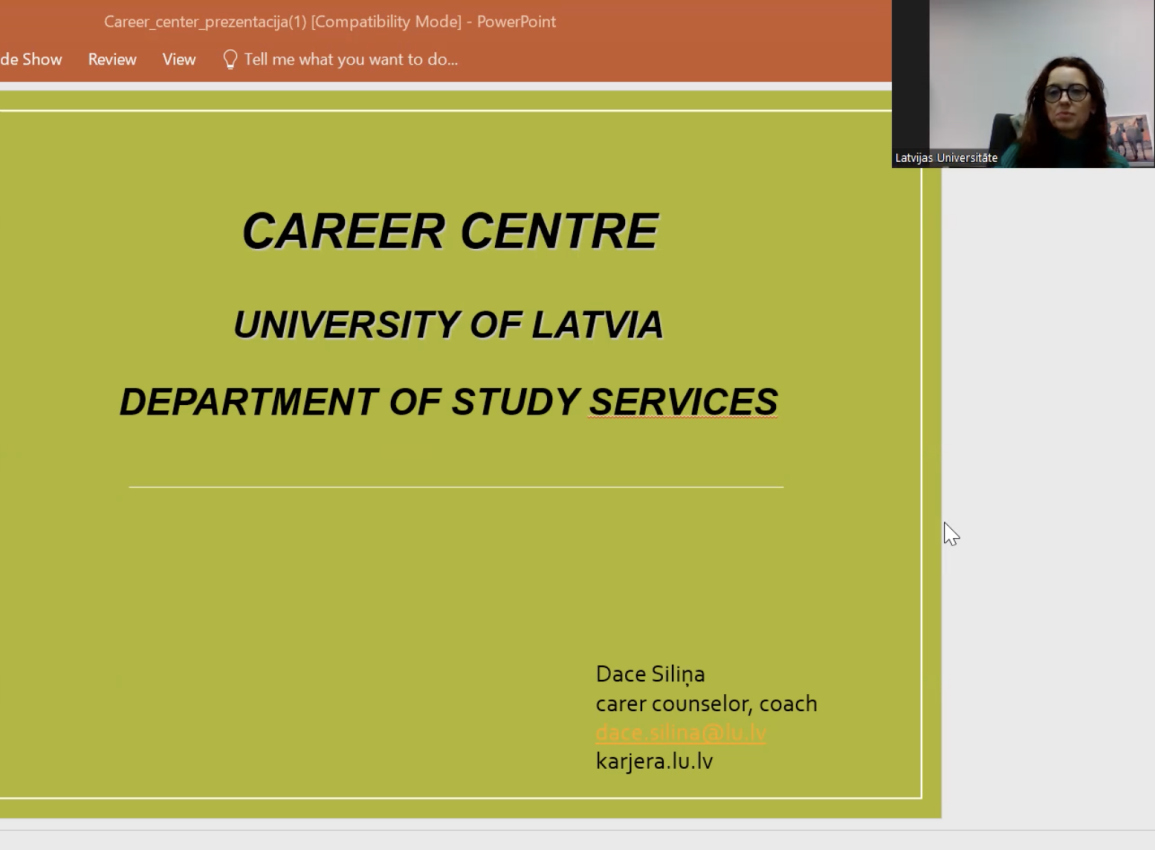
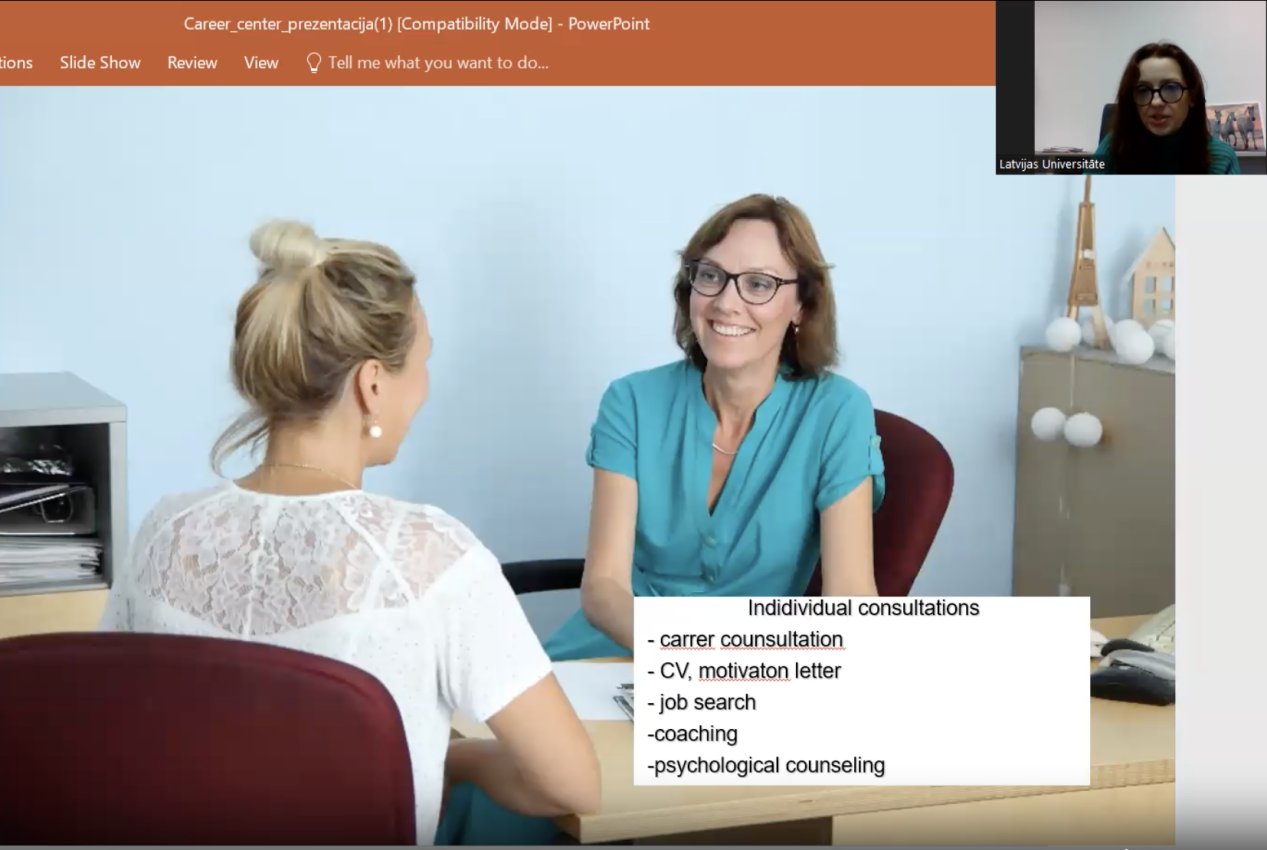
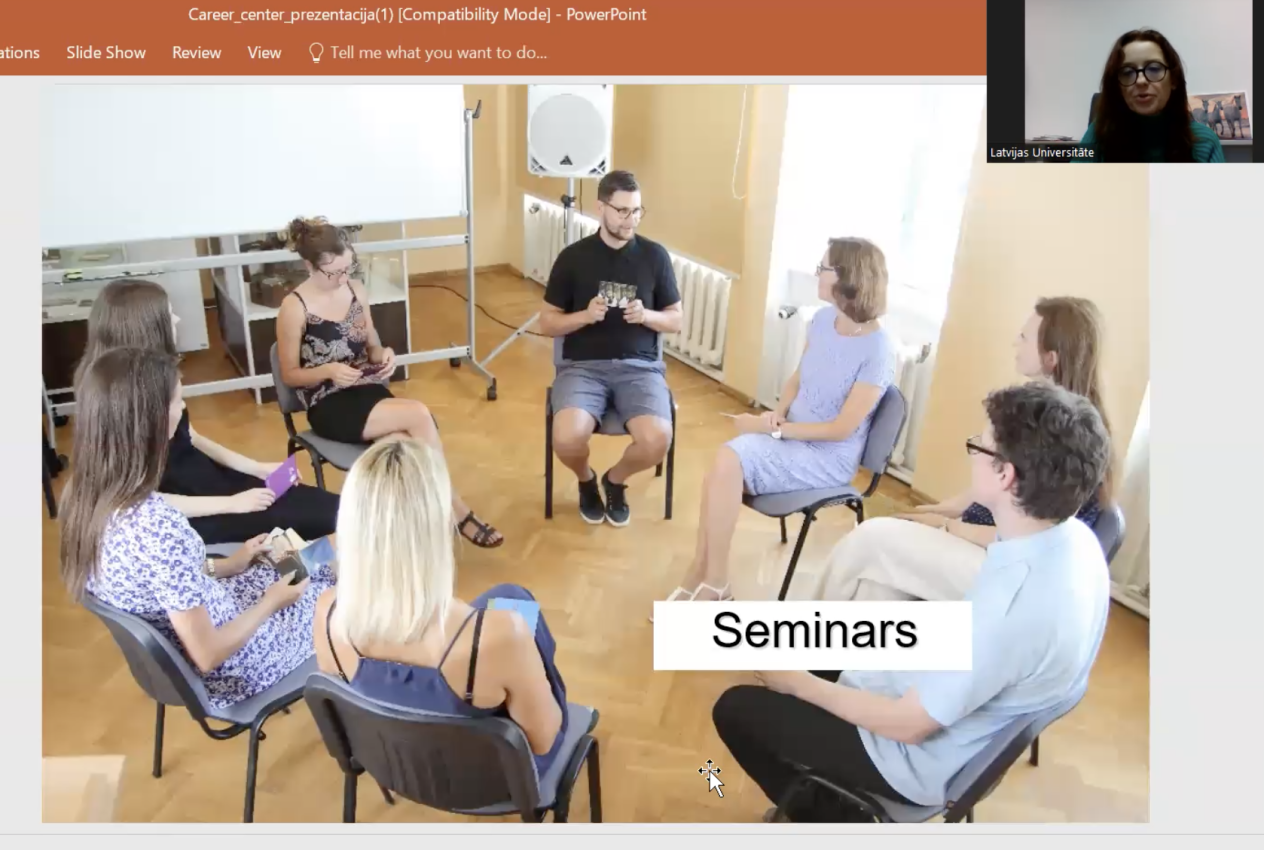
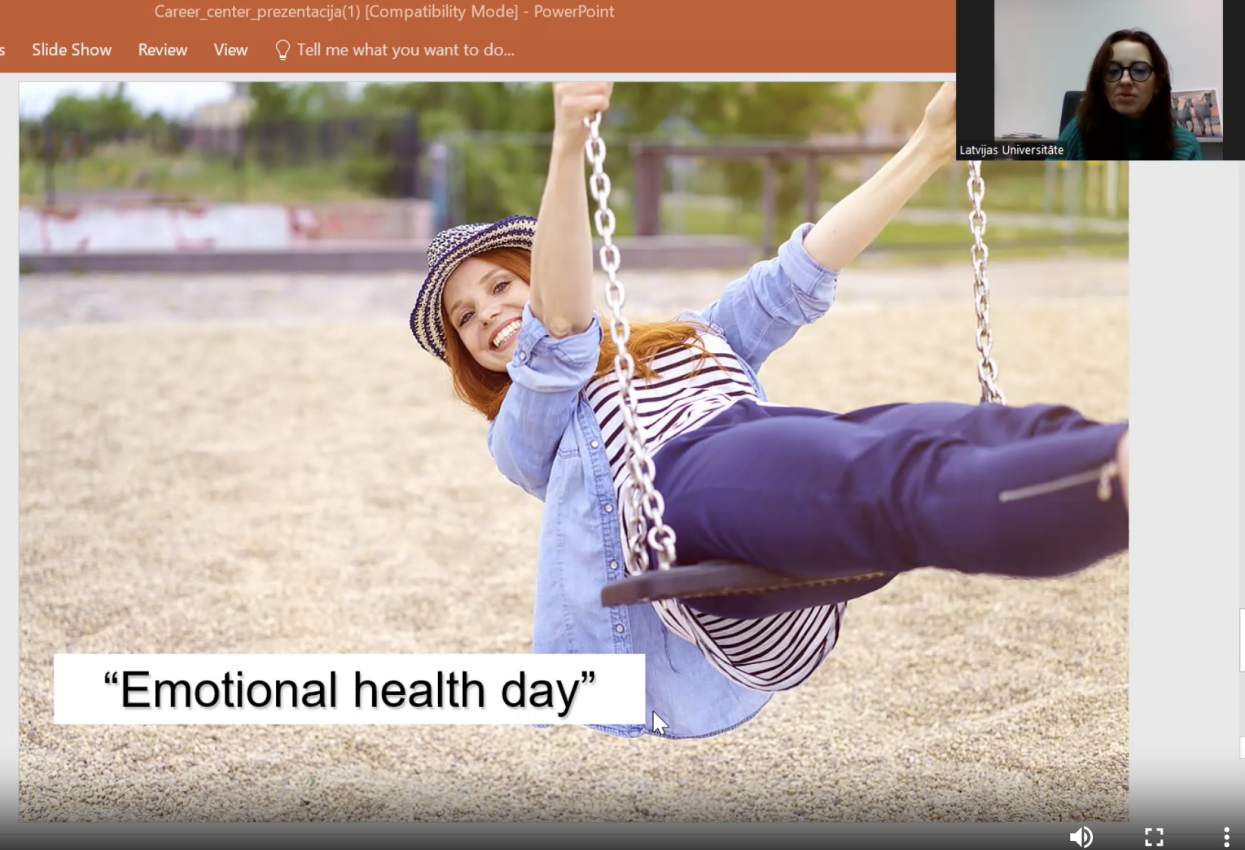
Webinar 2. 05/13/2024 Consultation center: what do we do and how do we work? (University of Tartu)
The career and psychological counseling service at the University of Tartu was established in 1999. Services of the consulting center include: individual consultations (advice on study issues, career counseling, career counseling, counseling of students with special needs and their adaptation in education); workshops on study skills, mental health, career planning, support groups for students with anxiety and ADHD; social circle is a supportive discussion led by students and coordinated by the counseling center to allow students to share joys and challenges and make friends from various fields of study; peer mentor training: peer mentors are specially trained students who support new students in adapting to the university. Students meet in a group of a maximum of 15 students 6-7 times without the coordination of the Center.
Special attention in the consultation center is paid to supporting students during their studies through various types of joint counseling and through support groups, providing primary assistance in psychological counseling, psychoeducation and prevention aimed at increasing self-awareness and development of students and management. As a rule, psychologists conduct up to five sessions per student - this ensures accessibility consultations for as many students as possible. Psychologists of the Center do not make diagnoses and do not conduct psychotherapy. If the students need more specialized help, they are sent to the emergency psychiatric care center.
The center's services are available to students of all levels, including doctoral students, international students, applicants, and graduates. Services are available in Estonian, English and Russian. Counseling is available on-site and off-site, students can choose the most optimal method. Appointments are required for career counseling, psychological counseling, and counseling for students with special needs. Center employees cooperate with all university services, the rector's office, the student union, training specialists, program managers, conduct seminars for university employees on student support, develop the Center's website, create two home pages: Mental Health and Career Gate. The center informs about its services through university website + video about student counseling experience, student newsletter sent weekly to students' e-mails, posters in faculties with QR code, advertising on internal screens of educational buildings, social networks FB and Instagram, services and events.
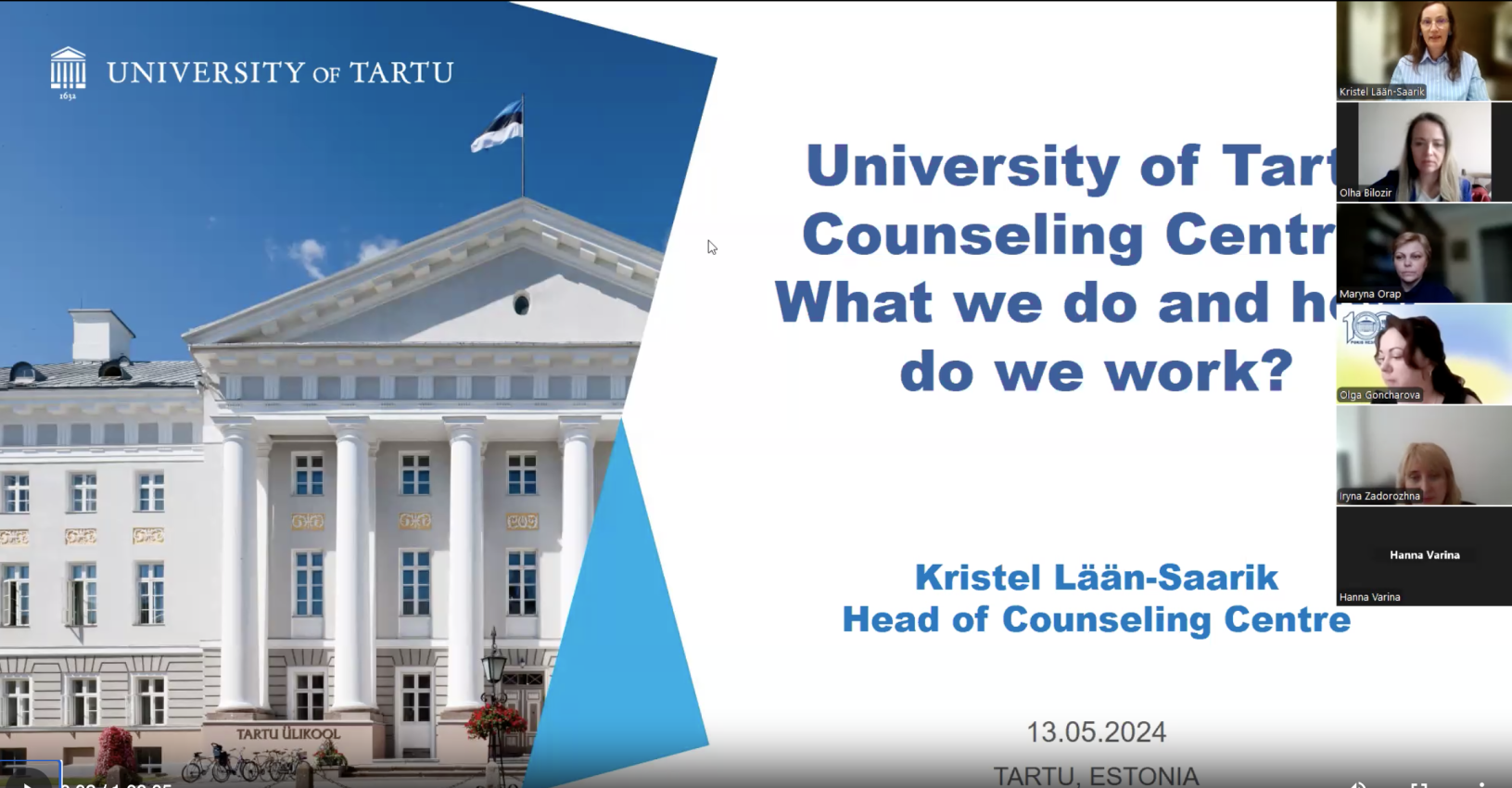
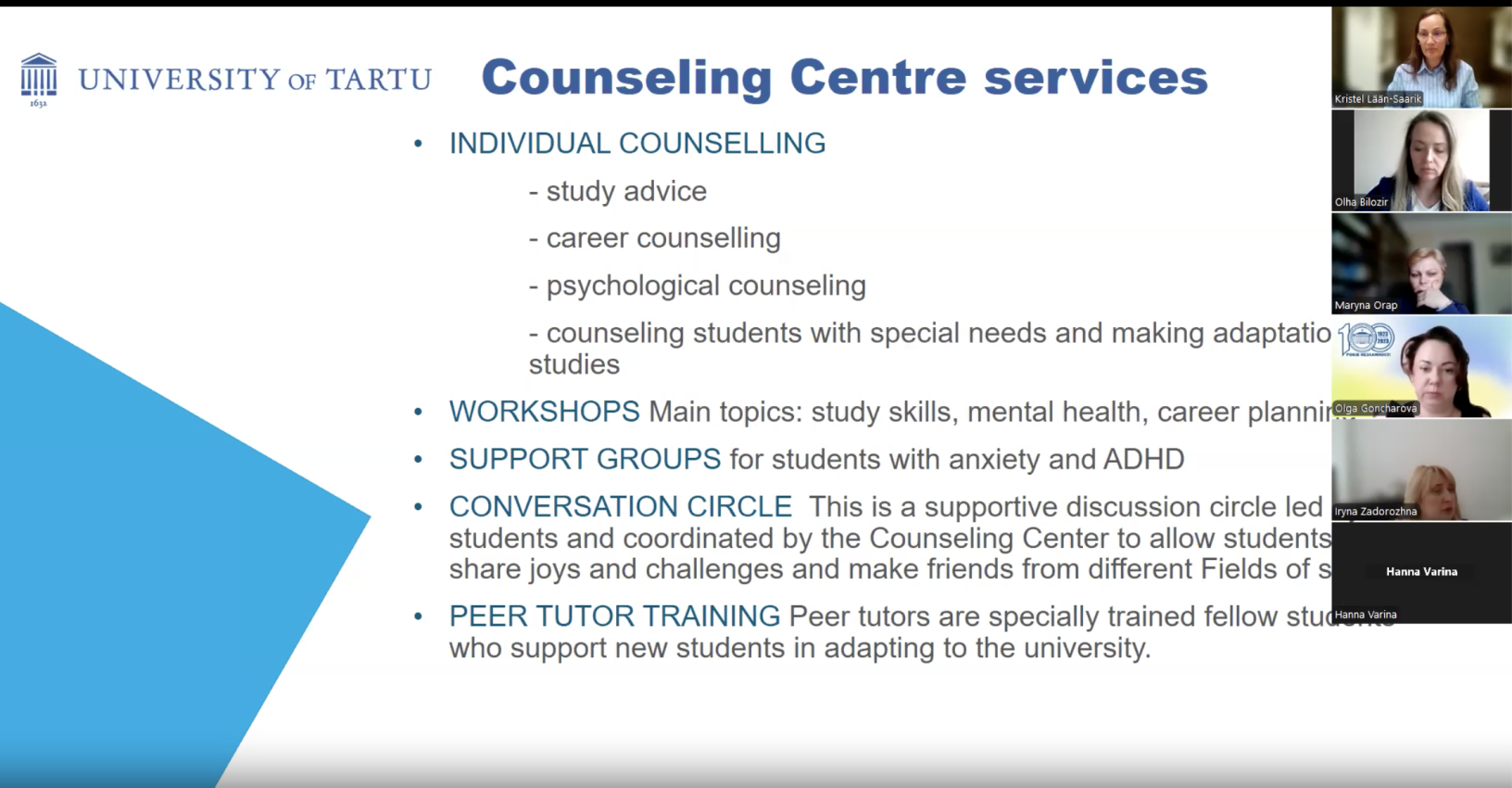
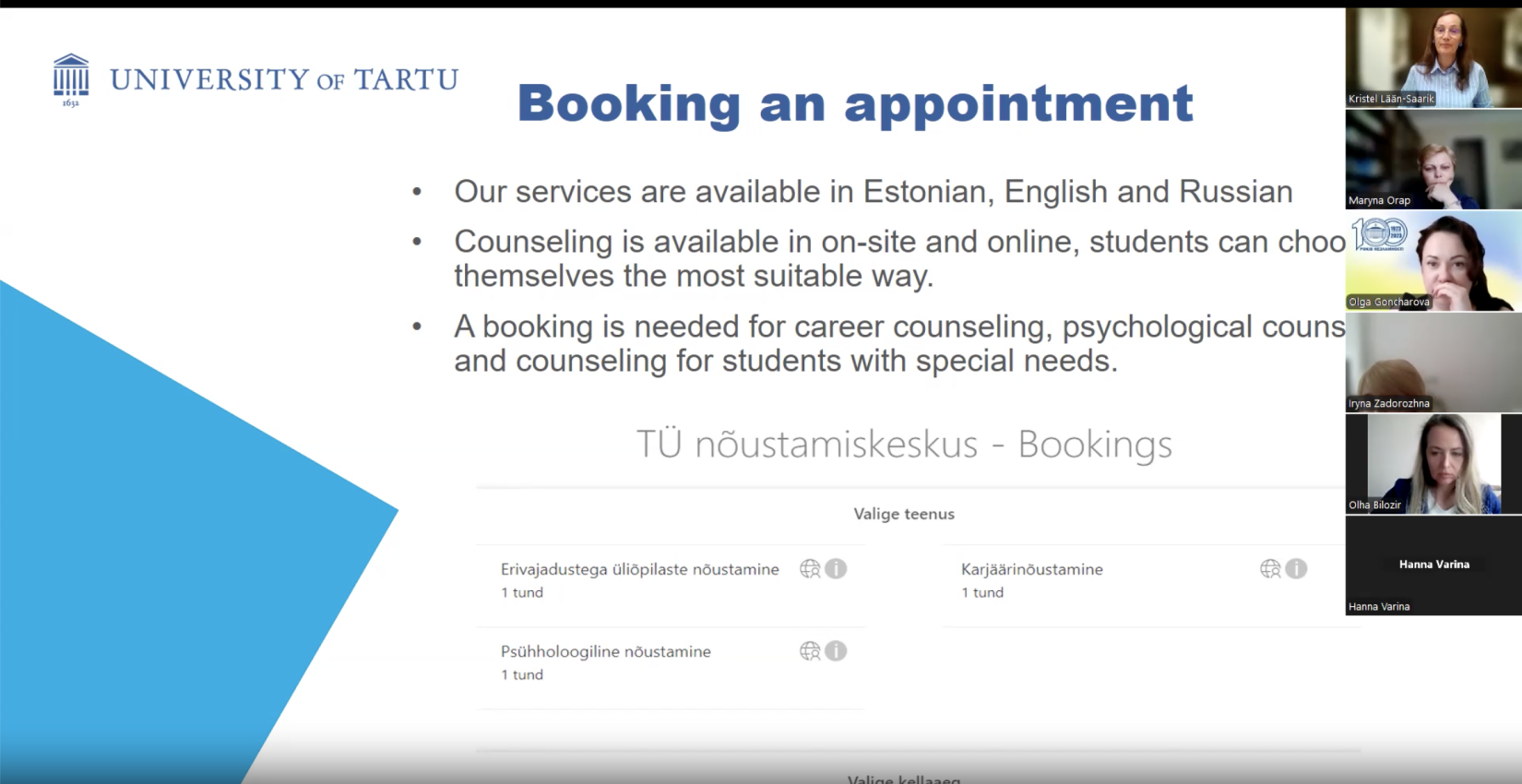
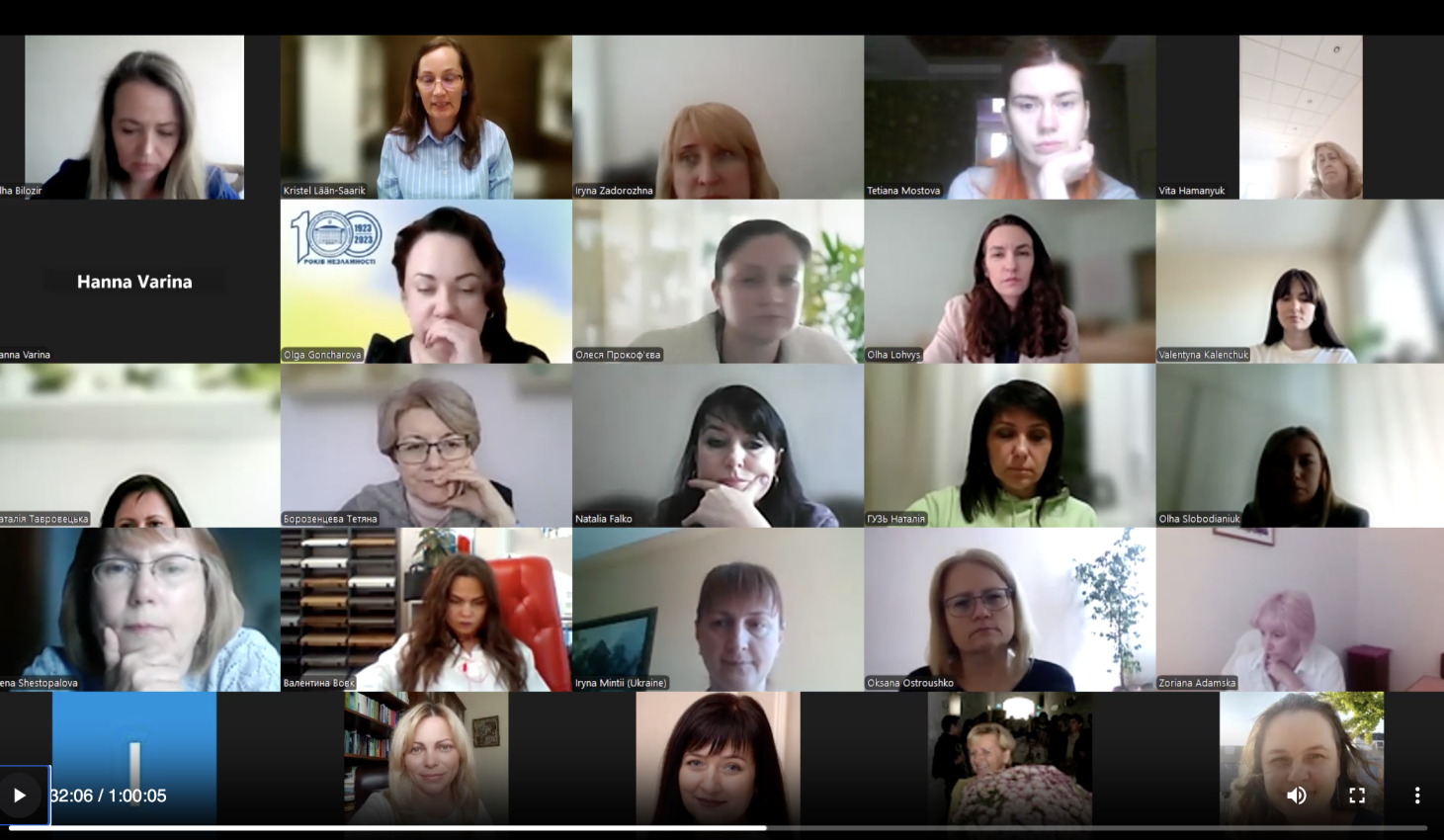
Webinar 3. 05/20/2024 Consultation center: work with groups (prevention and intervention, mutual support) (Tartus University, Tõnu Jurgen and Sharifa Rzaeva.
The trainers talked about the multi-level model of psychological care in Estonia, the Estonian Ministry of Social Affairs' Mental Health Action Plan for 2023-2026, which aims to improve mental health support through various planned activities and services.
Trainers shared the experience of group forms of work in mental health support and emphasized the advantages, emphasizing how group work can complement or become an alternative to individual therapy.
Special attention is paid to MrRsnamed after advicem to overcome anxiety in the learning environment. The goal of this group counseling program is to help students manage anxiety in the academic environment, with a particular focus on exam and performance anxiety. The skills learned in this program can also be applied in other areas of life. During the sessions, participants explore their anxiety, related thoughts and feelings. They learn techniques to effectively manage their thoughts and attention. Working in a group allows participants to receive peer support, which can significantly reduce performance anxiety. The group meets six times, with a maximum of eight participants per session.
Support group for students with attention deficit hyperactivity disorder (ADHD), including graduate students, is designed to help overcome the difficulties associated with this disorder and its impact on learning. The group provides a platform to share experiences and find common strategies to overcome difficulties. During the meetings, participants can discuss their experiences and motivate each other regarding university studies and daily tasks. Sessions take place in the format of informal discussions that do not require prior preparation.
Mental Wellbeing Group aimed at supporting self-care and increasing resilience among students. This online group operates as a semi-open group, allowing members to join or leave every five sessions, subject to mandatory participation for five consecutive sessions. This group is particularly useful for people who have previously received individual counseling and need ongoing support to maintain their progress and prevent relapse.
Benefits of group support for students:
- Common experience: Group support creates a safe space for students to communicate, helping to develop a sense of community and reduce feelings of isolation.
- Mutual support: The group provides support, compassion and practical advice through a network of like-minded people.
- Accessibility: Group therapy is more affordable than individual therapy, making it more affordable.
- Social skills: Group interaction improves communication and interpersonal skills, preparing students for future success.
- Hope and inspiration: Watching peers overcome challenges inspires hope and resilience.
Conclusions: Group support helps students overcome the difficulties of university life and achieve success both academically and in their personal lives.
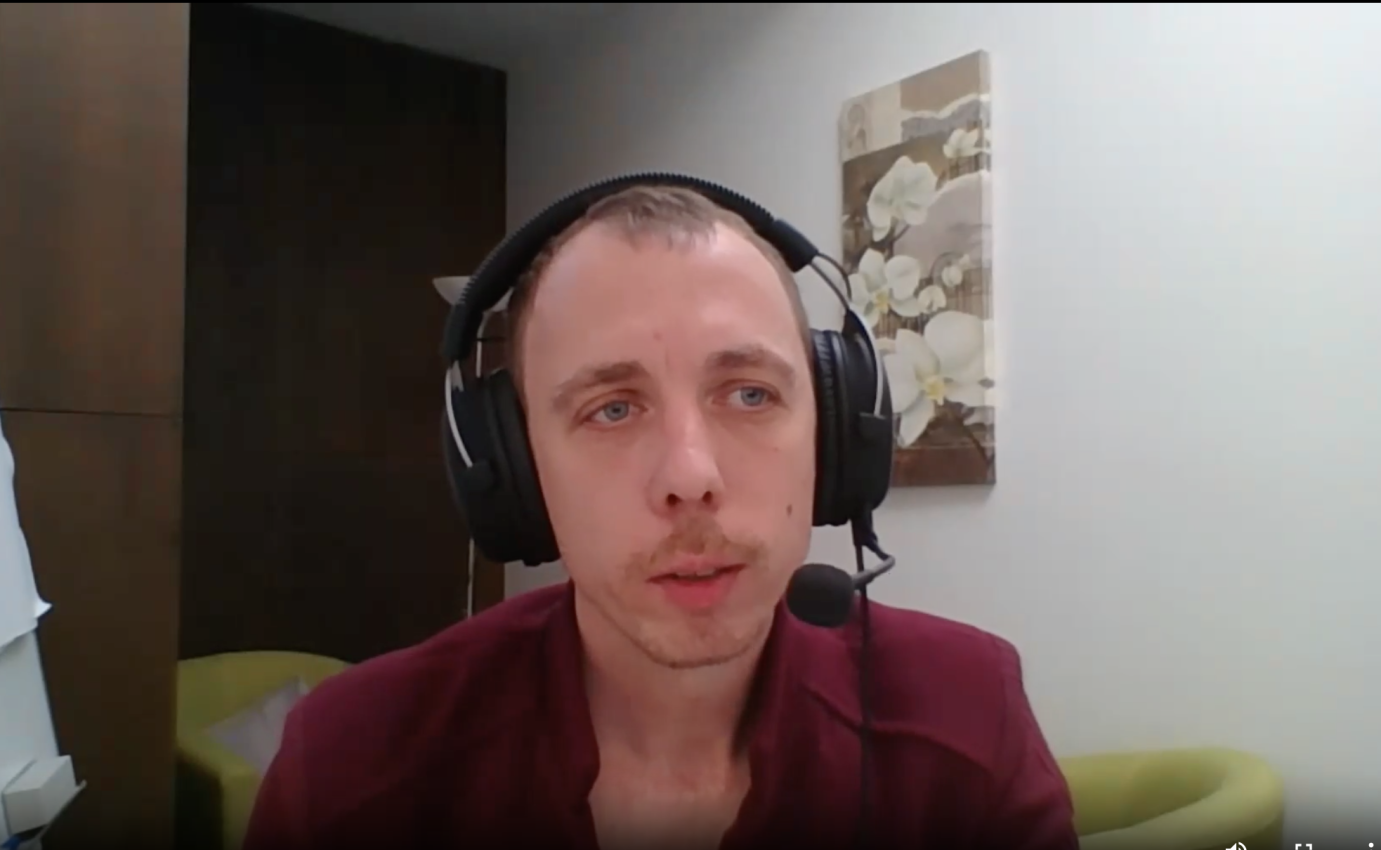
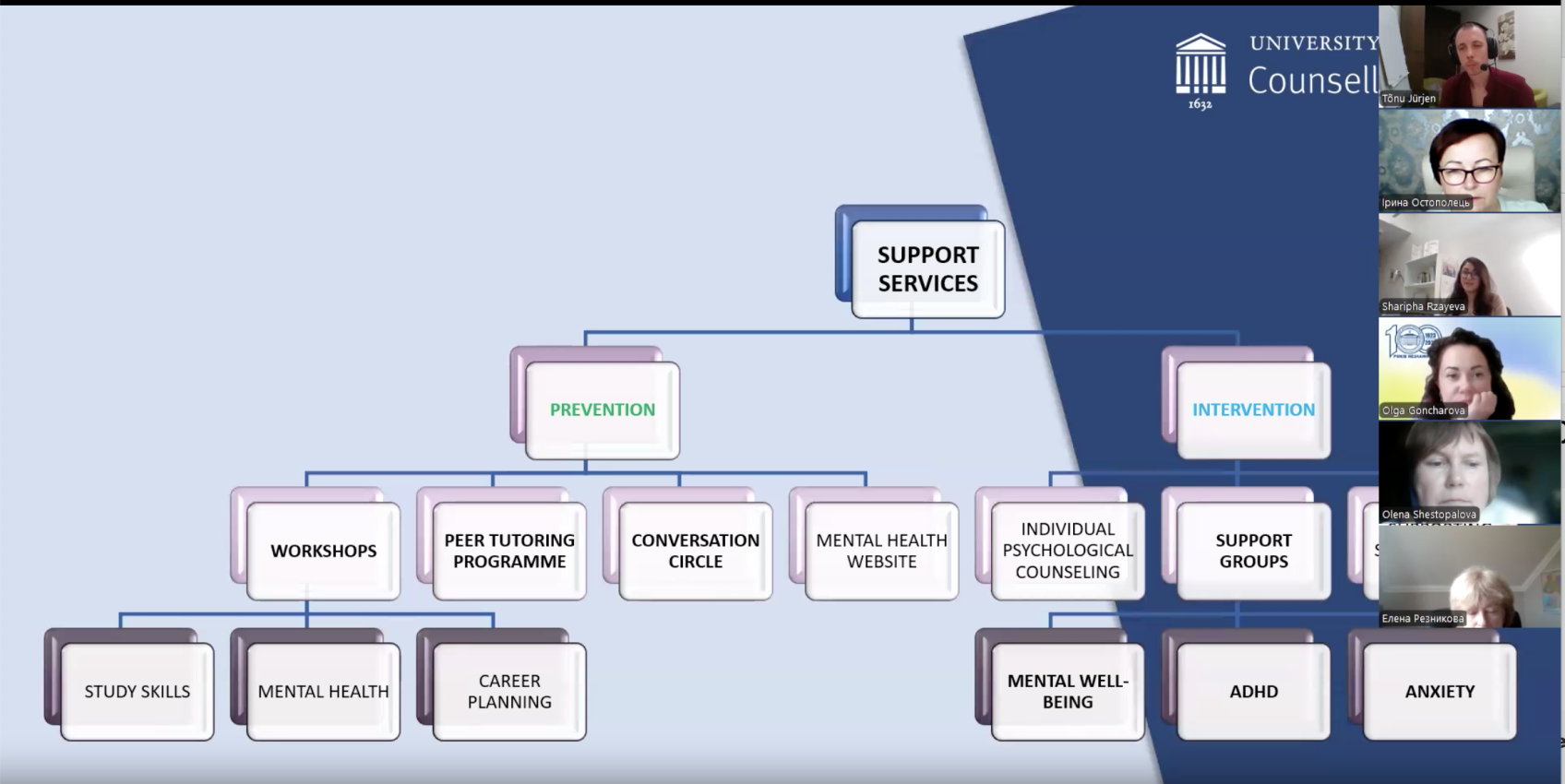
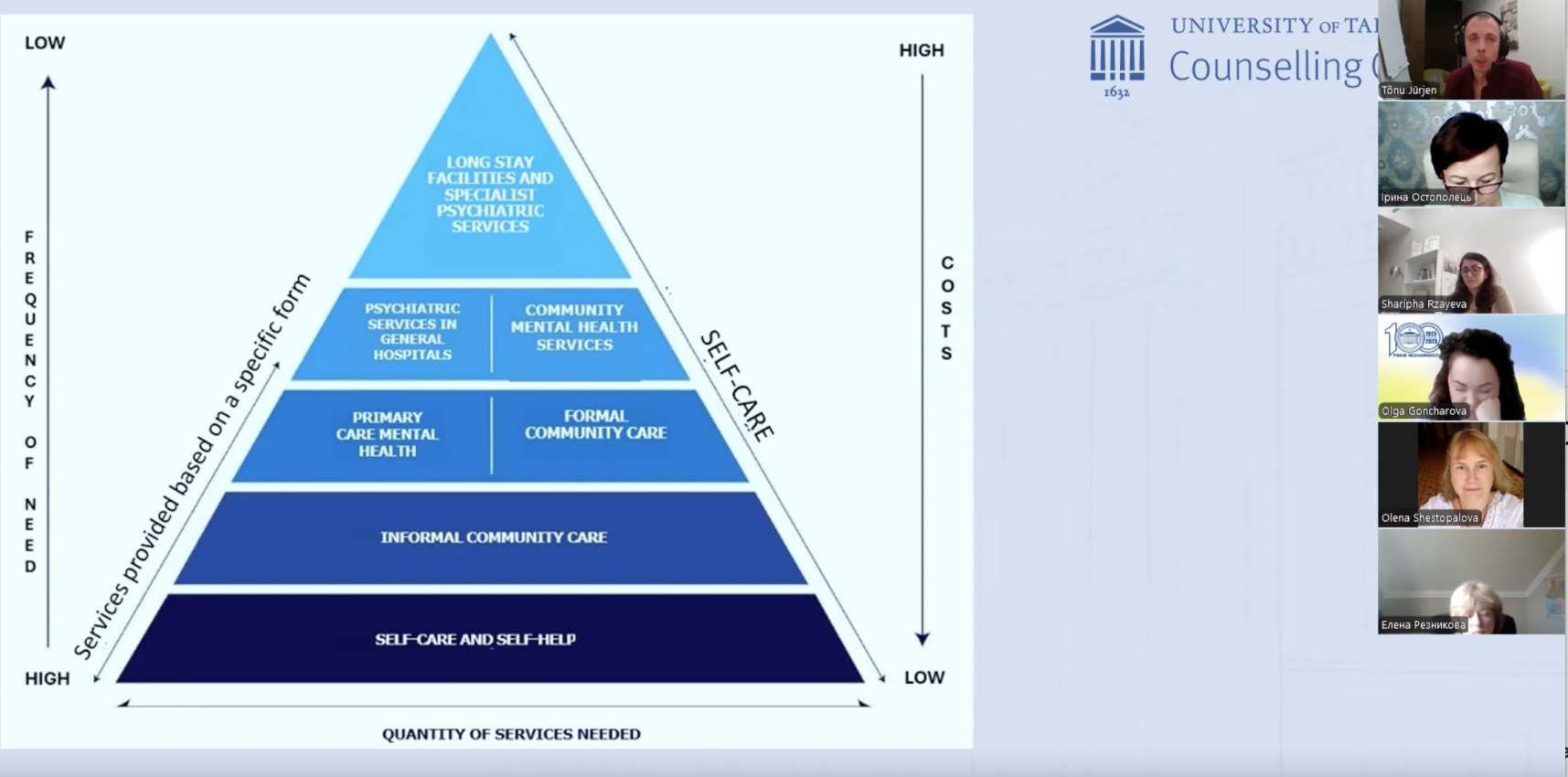
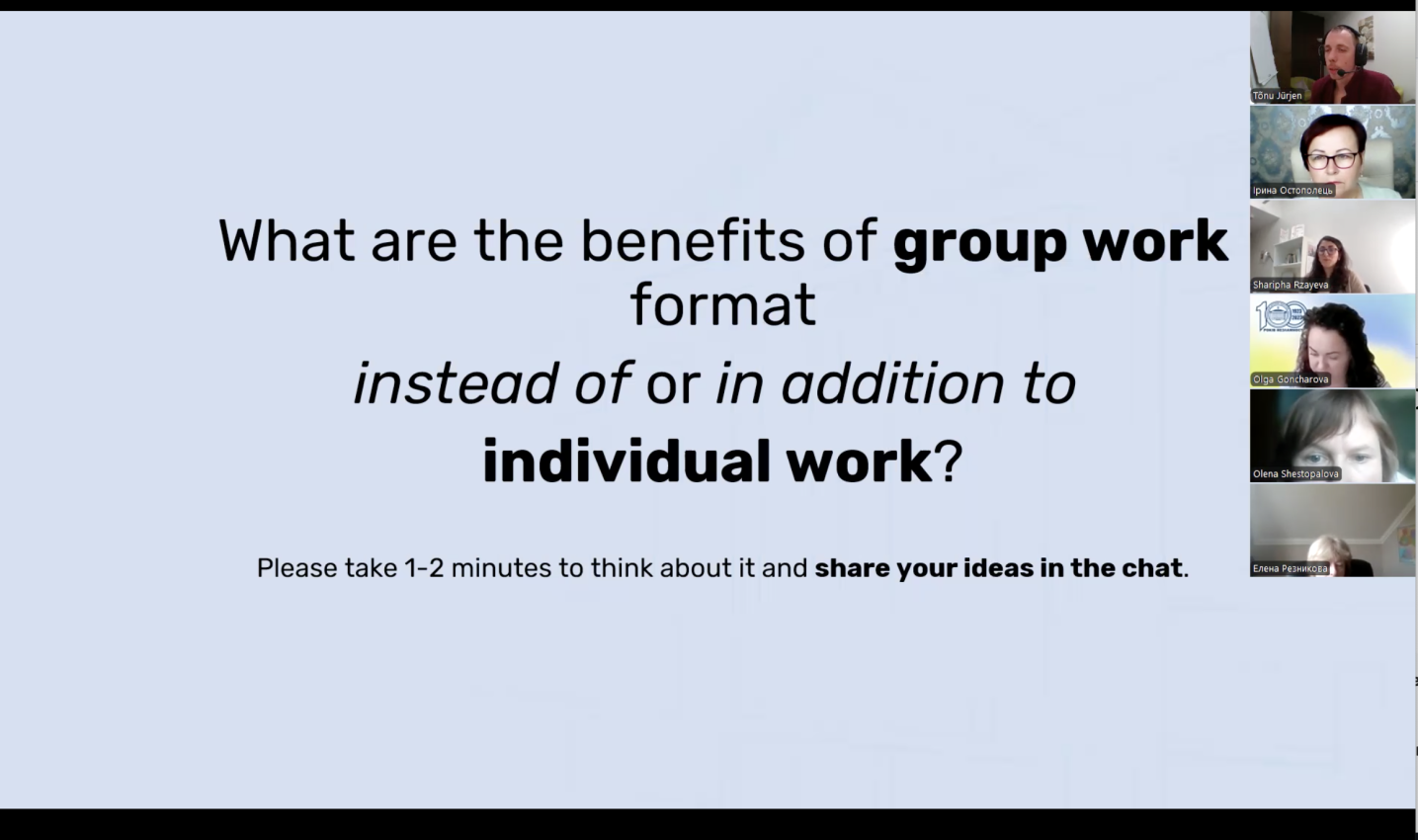
Webinar 4. 23 05.2024 Psychological support center of the Faculty of Psychology - how we work and achieve our goals at the University of Latvia.
The webinar was conducted by Laura Pirsko (Latvia) - guarantor of the master's program, head of the Center for Psychological Assistance at the Faculty of Educational Sciences and Psychology, at the Department of Psychology. The psychological help center exists for everyone who needs help.
Target groups: students, clients - consulting, society - research of psychological interaction between enterprises. Tasks of the center: to offer internships for psychology students; provide a base for scientific research; receive income; organize educational events; to interact with society to prevent problems and solve existing problems; organization of seminars for the community, etc. Individual and group consultations are available at the center. Among the problems of clients: depression, anxiety and emotional states, problems with adaptation (marriage, change of residence, etc.), problems with education.
The second-year students of the master's program in clinical psychology work as consultants in the center (2 sessions with clients per week). Students develop professional skills under the supervision of a teacher, especially in difficult situations that require an immediate response (e.g. suicidal states)
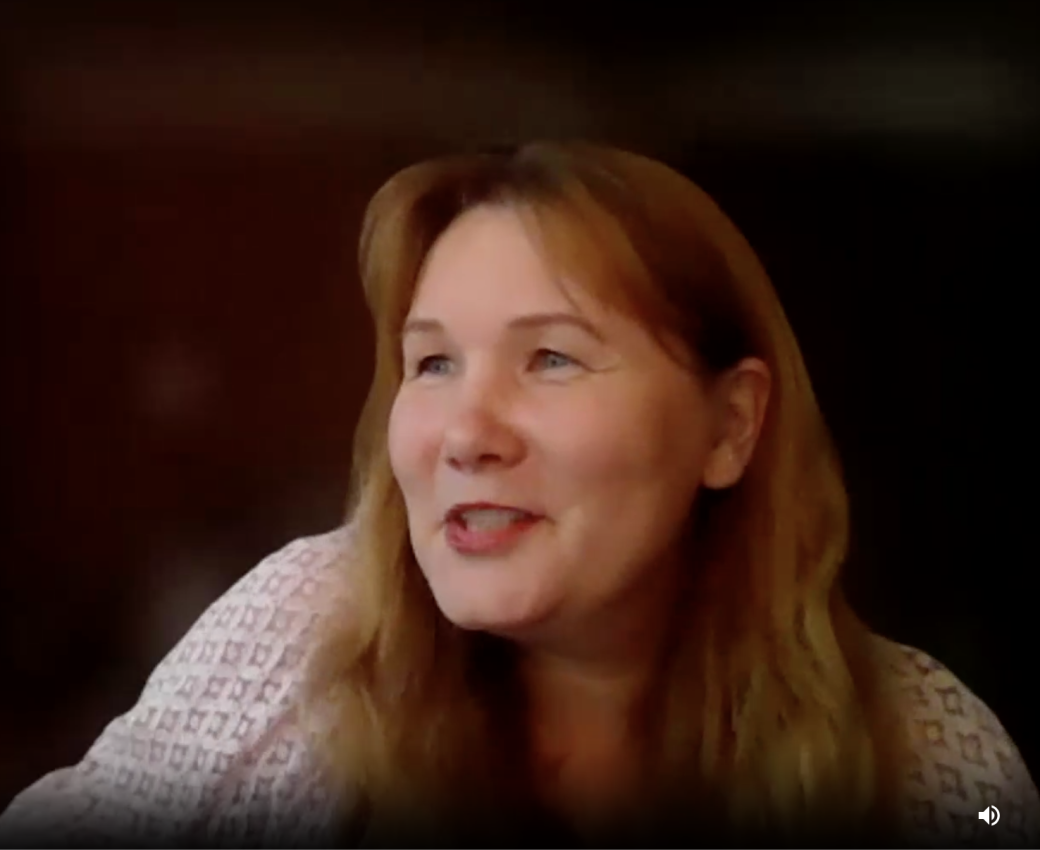
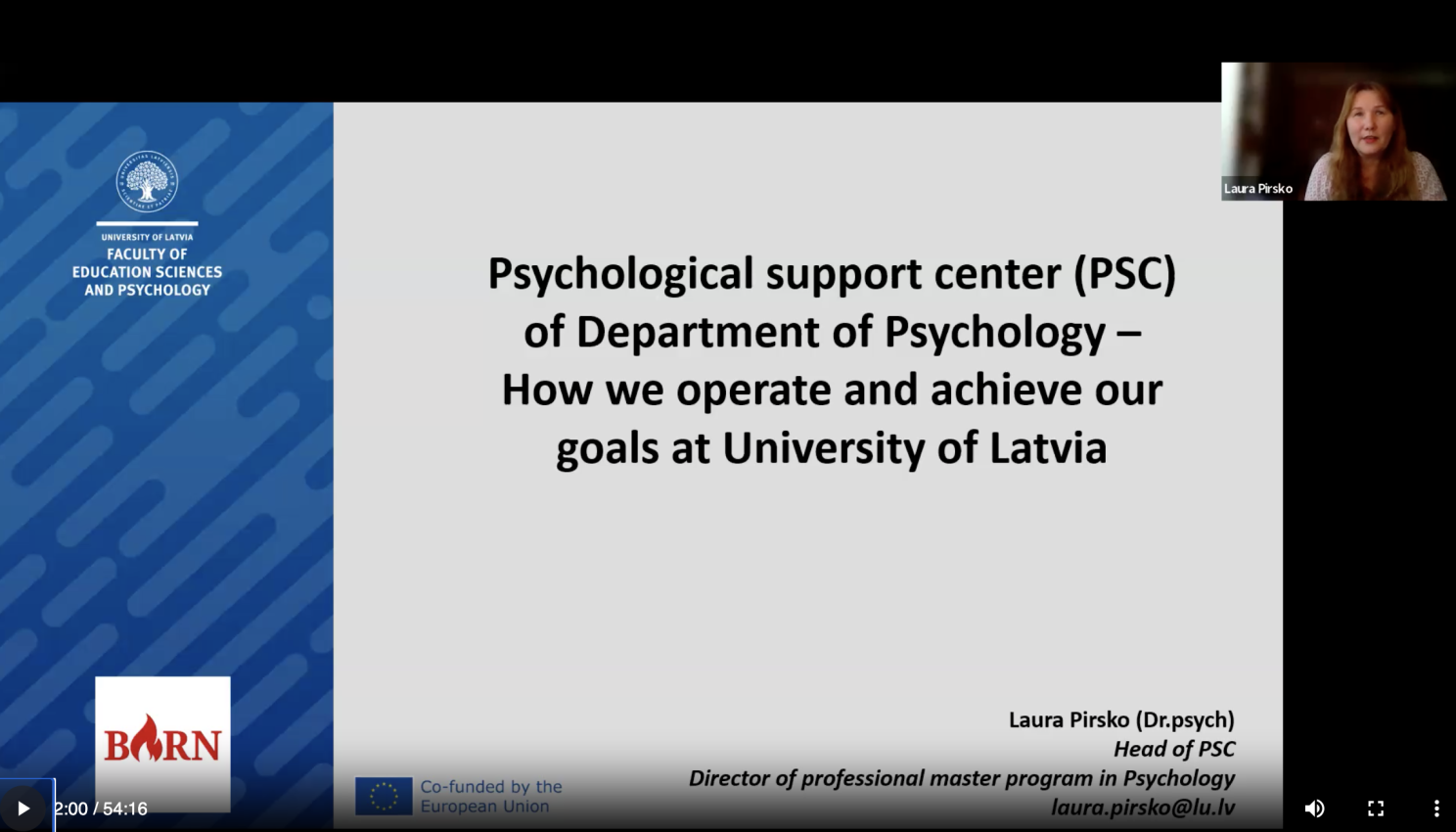
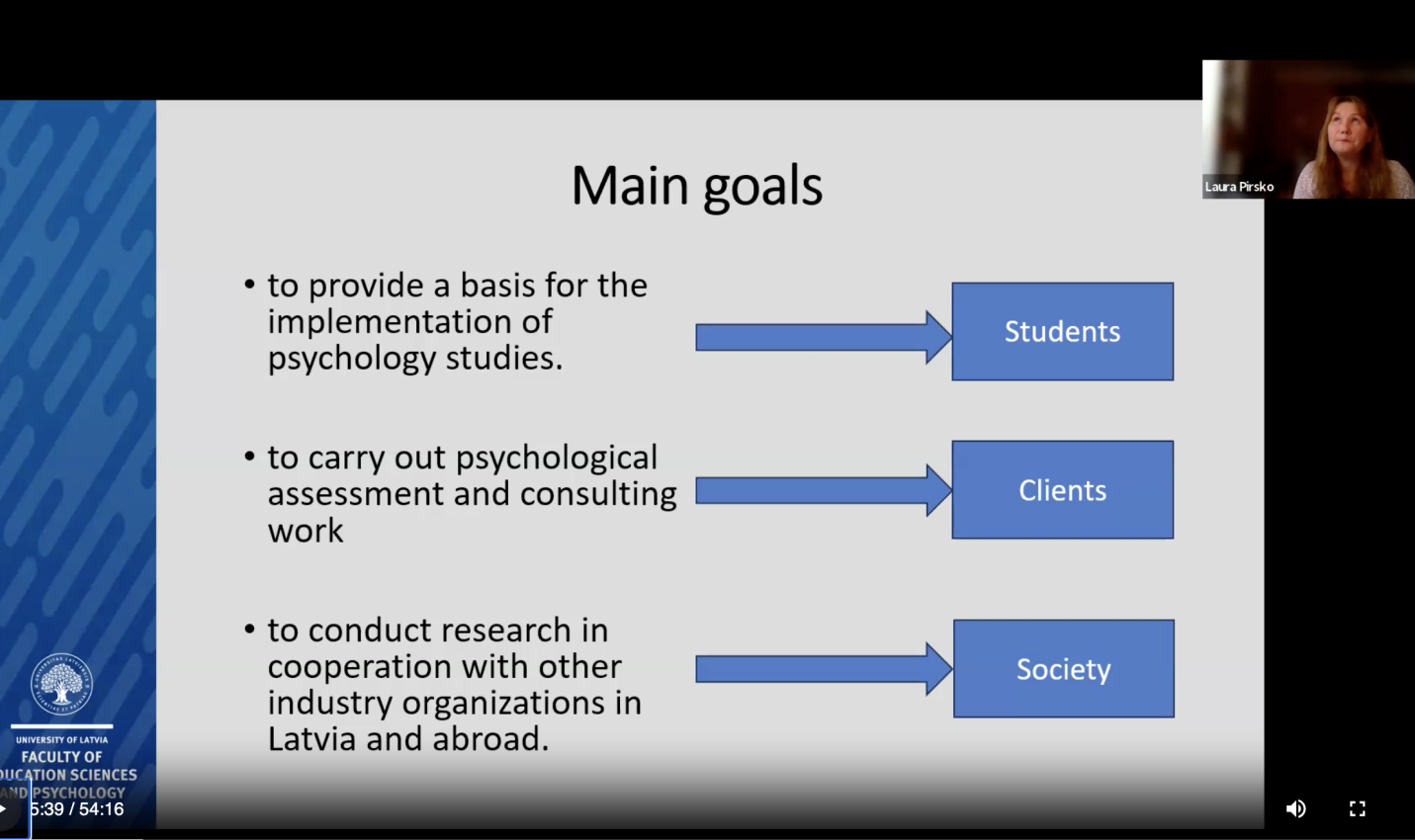
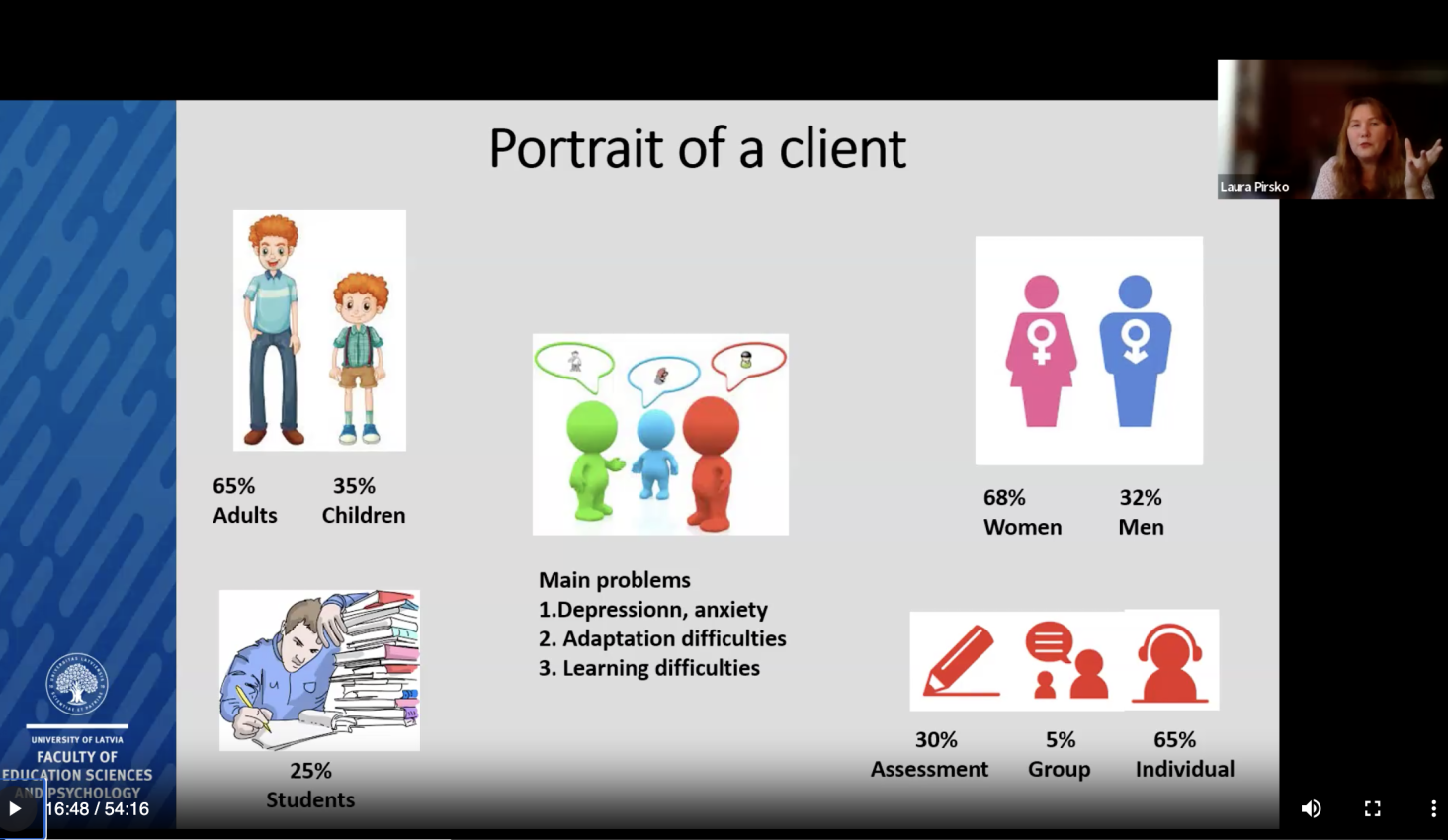
Webinar 5. 05/29/2024 Psychological support and mental well-being. Center for Psychological Counseling of the Free University (FU), Berlin.
The work of the Center is closely related not only to the support of psychological issues, but also to all issues related to education. The center also has its own information service with a bulletin board. There, students can find answers to their questions before contacting the Center's staff. The Center's employees carry out various projects related to mental health. In addition, there is a special department for students who have not yet decided on their future profession and can study for a year without a major. They also develop projects that support schools and students. Often, students and teachers visit the university to observe the educational process. The information on the website of the center is updated every day. The site always provides clear information without textual overload in order to focus students' attention.
To receive counseling, students must make an appointment by filling out an application. The first consultation can be carried out already within two to three weeks from the moment of registration, but the Center does not provide long-term counseling, usually no more than five consultations.
The center closely interacts with teachers in order to find out if there are any problems or deviations in the behavior of students. Issues related to students' complaints about their group mates, whether they behave strangely or post strange things on social networks, are considered.
The speaker emphasized that at the beginning they had to make a lot of efforts to advertise and disseminate information. Advertising leaflets about the Center's services are designed in English and German. The information was distributed in various faculties.
The center also offers workshops and group classes, which require advance registration via e-mail. Up to six classes are usually held. Counseling is short-term and time-limited. The most frequent reasons for counseling are the problem of self-organization, procrastination, difficulties in making decisions, etc.
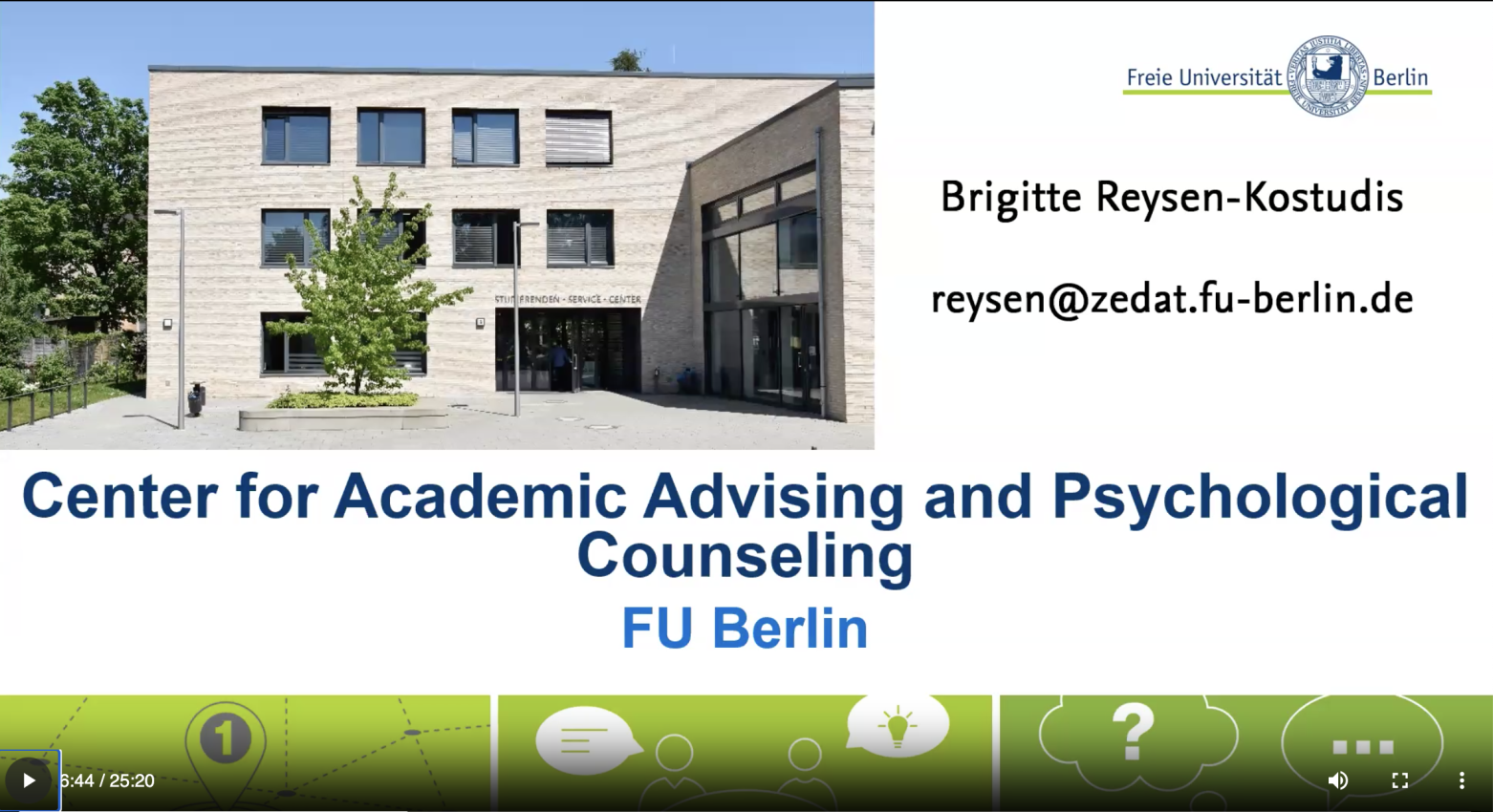
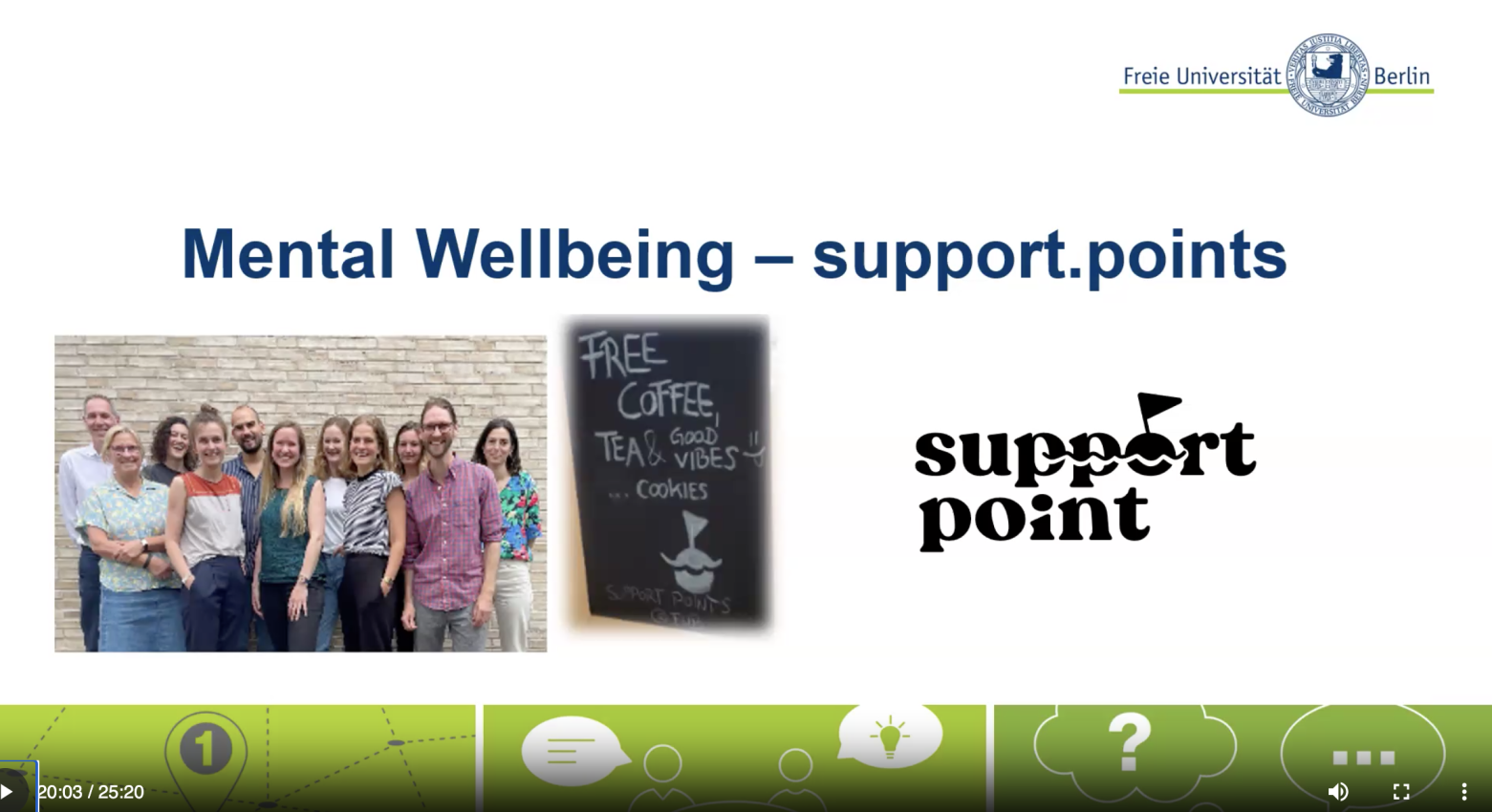
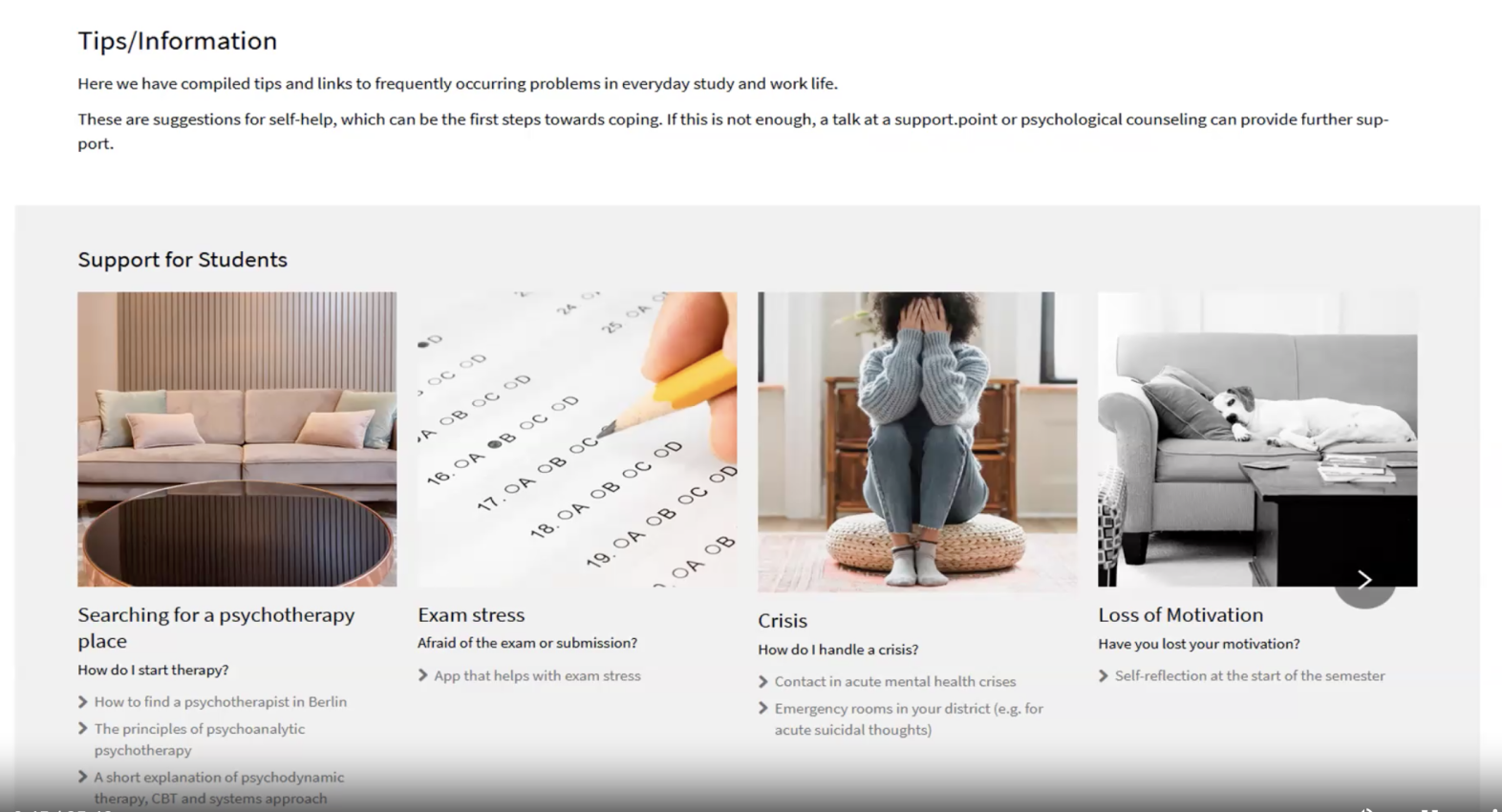
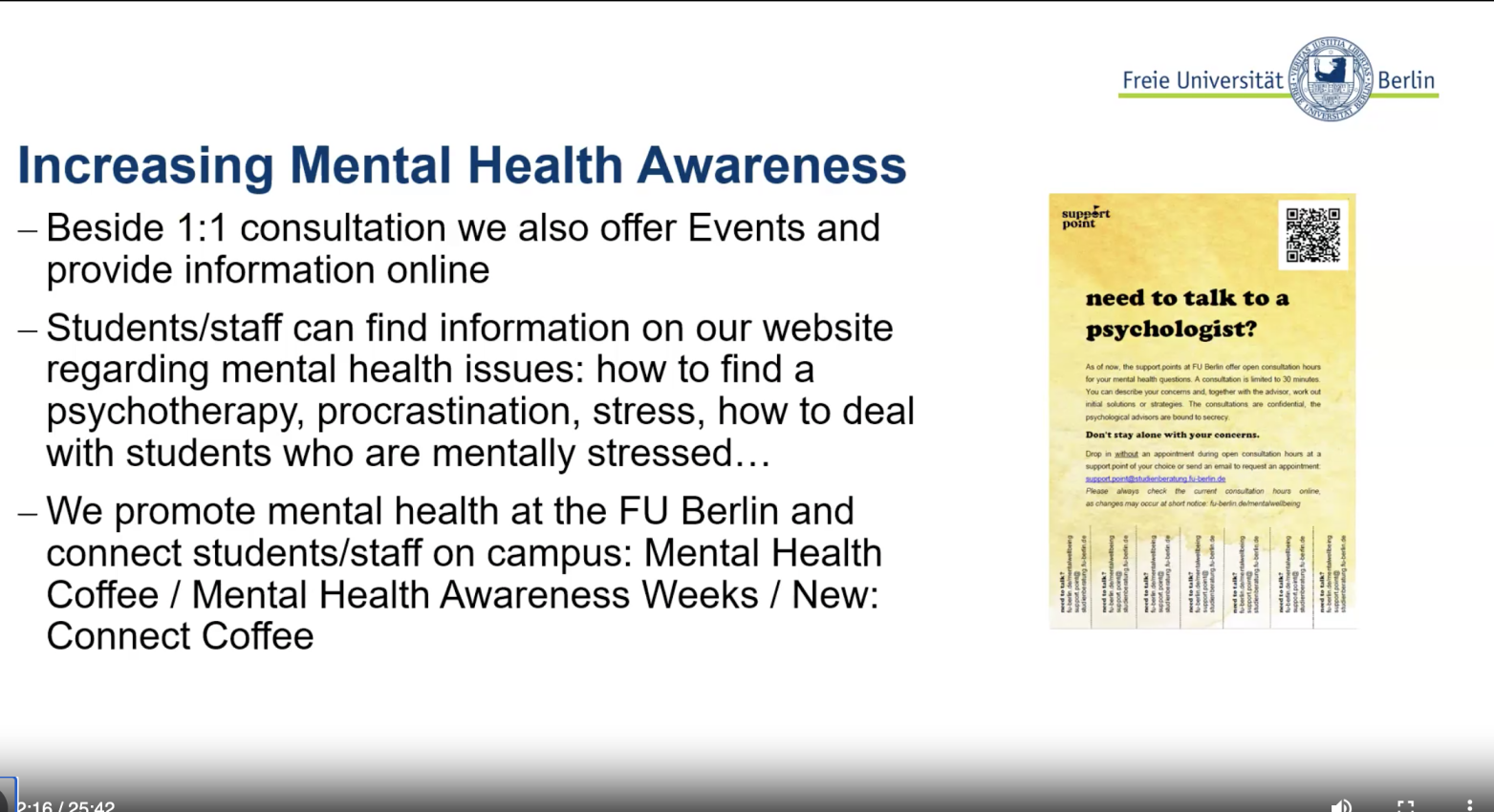
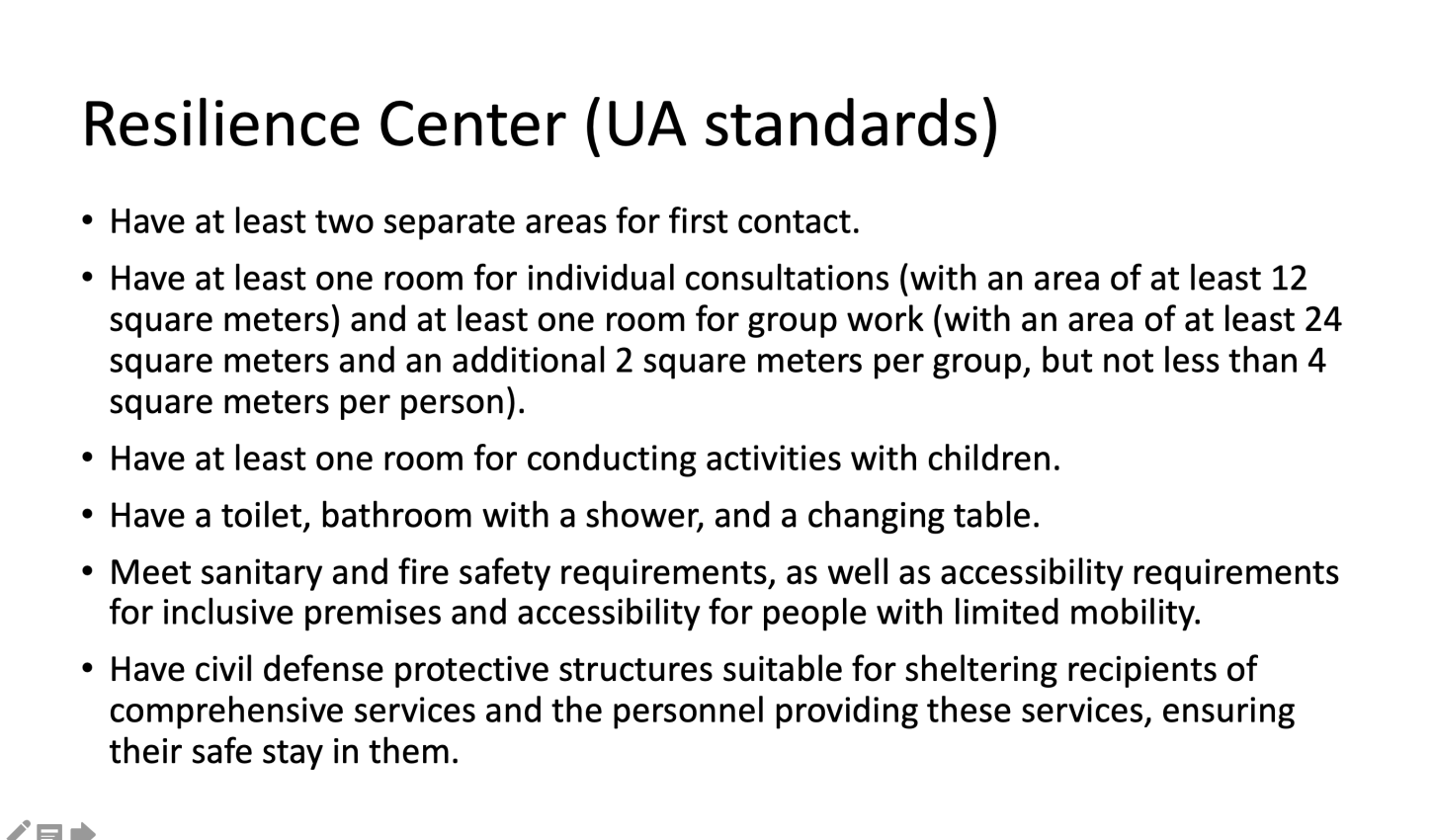
Webinar 6: 13.06.2024 Joint webinar "University psychological service and support".
The webinar "University psychological service and support" was devoted to improving psychological stability and well-being in university settings. The establishment of comprehensive sustainability centers was emphasized and various areas of support needed for this purpose were highlighted.
Key presentations and discussions:
Topic: Differences between university sustainability centers and those proposed by the Ministry of Social Policy of Ukraine.
The first part of the webinar began with a discussion of the differences between these centers. Kateryna Bondar and Lars Kulhinke focused on the fact that the centers financed by the Ministry of Social Policy can become a reference point for the development of space planning documentation for the universal design of centers. This includes taking into account the special needs of visitors, such as people in wheelchairs and the visually impaired. They also discussed possible mandates for sustainability centers, emphasizing their important role in supporting society.
Another aspect of the discussion concerned the financing of projects. Participants emphasized that Erasmus projects should have separate funding and uniqueness. This also applies to any Ukrainian university. Bondar noted that it is necessary to take into account the difference between such institutions and ensure their financial sustainability.
Part of the webinar was devoted to planning the space of the centers. Ihor Popovych emphasized the importance of the correct distribution of spaces for group classes and individual work. It was discussed what the square footage of the premises should be, as well as the composition of additional spaces. At the end of the webinar, Laura Pirsko demonstrated the planning of the new psychology center at the University of Latvia, which will be opened next year.
The conclusions of this part of the webinar emphasized the importance of detailed planning and the development of universal design for psychological centers. Such centers should be inclusive and take into account the special needs of visitors, providing effective support and development of resilience.
University sustainability centers:
- Location: in universities.
- Services: a wide range, including research, educational programs, consulting and practical assistance.
- Focus: development of individual and institutional resilience.
- Funding: A combination of government funding, grants and private donations.
- Autonomy: greater than that of state centers.
Sustainability centers of the Ministry of Social Policy:
- Location: It is established at the level of territorial communities.
- Services: Basic social services including information, counseling and psychosocial support.
- Focus: Increasing community resilience to crisis situations.
- Funding and management: funded and managed by the state.
- Key insight: University centers should complement, not duplicate, public centers by offering specialized services and conducting research to improve sustainability policy and practice.
Discussion with Professor Lars Kulchynke and representatives of Ternopil National University
The issues of Ternopil University concerned several areas, the main one of which was the development of advisory and short-term training programs.
1. Advisory and Training Programs
Psychological centers created as part of the project will focus on providing primary care. This includes counseling services and short-term training, after which students will be referred to long-term therapy. For this, it is necessary to map the needs of each university, which will allow to effectively determine the amount and forms of assistance.
2. Diagnostic questions
Kryvyi Rih Pedagogical University raised the issue of diagnostics and diagnostic data packages. It was noted that the process of diagnosis and translation of the tools takes more time than planned. Therefore, it was decided to focus more on advisory and training components, including career counseling.
Latvian Experience
During the webinar, the issue of developing components of advisory programs was also discussed. Laura Pirsko from the University of Latvia shared the experience of creating such centers at their university. They have their own slippers and are ready to spread this experience further.
Melitopol University
Melitopol University highlighted a number of issues, including 20 different topics that were considered as prospects for development within the project. This includes content for training programs, job duties and qualifications of specialists who will work at the center. It was decided that specialists should have at least a master's degree.
Kherson University
Kherson University raised the issue of online counseling and its support. Points about supervision and its financing were also discussed. It was stated that this requires additional funding (co-funding).
Horlivka Institute of Foreign Languages
Horlivskyi raised an important issue about the work with anxiety and depressive states within the framework of university centers of psychological assistance. The discussion emphasized that centers should focus on psychoeducation and counseling that includes psychological education and self-help techniques.
Psychoeducation and Counseling
Psychoeducation and counseling are the main functions of university psychological care centers. This involves training students in basic self-help techniques and providing primary psychological assistance. The main goal is to help students cope with the initial signs of anxiety and depression, giving them the necessary tools to work independently on their mental health.
Long-term Support
Horliv Institute of Foreign Languages also pointed out that more clinical support requires long-term interventions, which university centers usually cannot provide. They specialize in primary care, and long-term care requires referral to appropriate specialists.
Experience of Berlin Universities
Analyzing the experience of Berlin universities, in particular Freie Universität Berlin, it was found that university centers do not specialize in long-term therapy. Instead, they focus on psychoeducational components and primary care, which promotes academic success and student motivation. Special attention is paid to work with foreign students, providing them with support in adapting to a new cultural environment.
University counseling centers should focus on primary psychoeducation and counseling, providing students with basic self-help tools. Long-term support requires specialized intervention, which can be provided through referral to appropriate specialists. The experience of Berlin universities emphasizes the importance of psychoeducational components and support for foreign students. This provides a comprehensive approach to students' mental health, contributing to their academic success and overall well-being.

